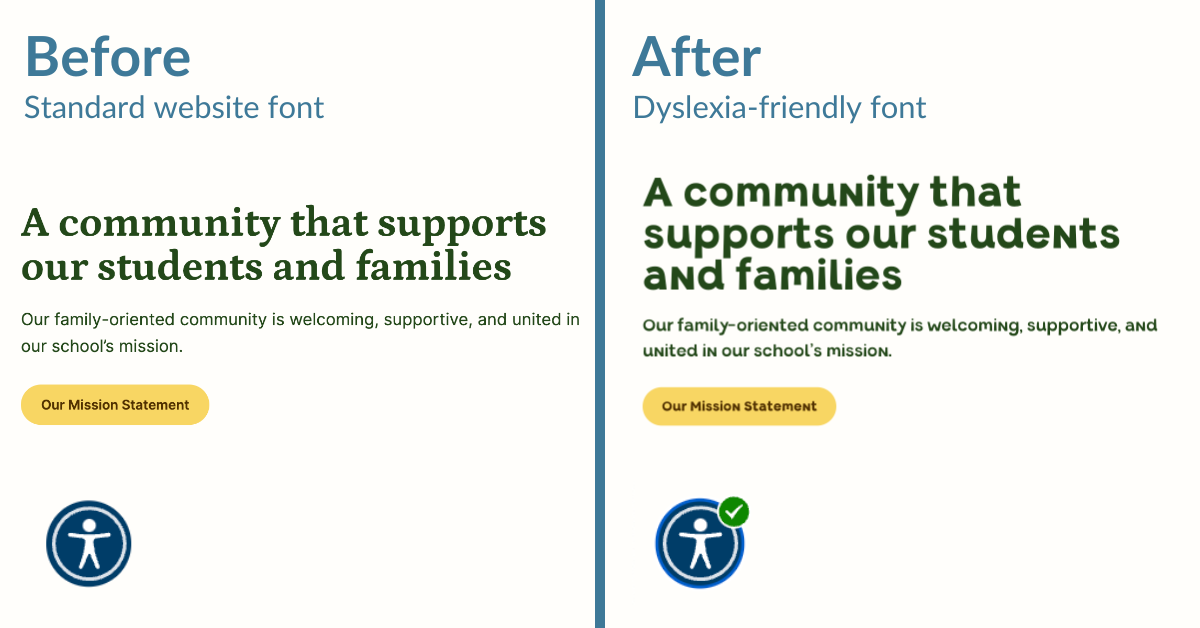Approximately 25% of adults in the United States have a form of disability, with the majority being mobility and cognitive impairments. As a result, a significant portion of the population, numbering in the tens of millions, relies on adherence to the Americans with Disabilities Act (ADA) to facilitate their daily activities.
However, awareness of the significance of ADA compliance is not universal. Some individuals overlook its importance. They fail to acknowledge the consequences of non-compliance, while others may be unaware of the potential benefits that ADA compliance can offer to support their objectives.
ADA compliance is crucial for all websites, but especially for those related to educational institutions such as schools, tutoring services, or other educational programs.
Here are some of the most significant reasons for education websites to prioritize ADA compliance across your digital real estate.
Promote Inclusion through Accessibility
One of the core principles in education is universality, with a widespread consensus that education should be accessible to all individuals.
Failure to comply with the ADA guidelines can result in education websites lacking the necessary features to accommodate individuals with disabilities. This can lead to difficulties or even impediments in their ability to navigate and access educational content, hindering their ability to acquire new knowledge and skills.
Given that education websites aim to provide opportunities to enhance knowledge and skills, they must avoid creating barriers that exclude individuals with disabilities from accessing and utilizing educational content.
Additionally, beyond avoiding exclusion, ADA compliance can facilitate a more user-friendly and accessible experience on education websites.
Many websites dedicate extensive efforts to improving their educational impact. However, ensuring accessibility to all users through compliance with the ADA standards may prove to be a crucial factor in optimizing the educational value of a website.
Despite the efficacy of a website in educating those who can access and navigate it, it fails to serve its purpose if it excludes individuals with disabilities, who are unable to utilize its content.
Give Users Control Over How They Experience Content
Many don’t realize how much ADA compliance can enhance user experience not only for those with a need for accessibility but for those who prefer to have a degree of control over how they experience control.
For example, one aspect of ADA compliance involves providing audio versions of your content as well as modifying fonts and providing alt-text to images.

These straightforward additions can be essential for someone who is blind or otherwise unable to read. Those who experience dyslexia or color vision deficiency (CVD) should be able to configure website settings to suit their needs. Some people prefer to have the option of hearing content instead of reading it.
This same basic principle applies to nearly all aspects of ADA compliance. Whether it has to do with making PDF files accessible or providing many different options for fonts, complying with ADA regulations makes a website more functional for everyone.
Avoid Fines & Follow the Law
In some cases, making sure to comply with ADA rules is essential to avoid fines. According to rules from the American Disabilities Act, failing to comply with this act can lead to a fine of as much as $75,000 for a first offense. Subsequent offenses can each lead to a fine of as much as $150,000.
This is another example of why it is in the own best interests of all education websites to focus on ADA compliance. Not only can it make your website more functional, but it can also save you from expensive fines.
Improve Reputation & Credibility
Private schools that promote specialized education for learning disabilities would be remiss to host inaccessible content for their target audience—or the parents of their target audience. Universities that aim to attract applicants will want to guarantee that they’re not turning away prospective students with inaccessible and unoptimized content.
That’s why, beyond facilitating content accessibility and avoiding exclusion, non-compliance with the ADA can result in negative perceptions of a website, particularly for an education website where universal accessibility is deemed important.
Adherence to the ADA guidelines helps maintain a positive image and reputation for education websites. As such, compliance with the ADA should be a priority for organizations that seek to offer inclusive and accessible educational opportunities.
Boost Website Usability & Performance
Having accessibility features on your website through ADA compliance tools can increase your website traffic. This can also lead to more engagement and a better chance of converting visitors.
Having an accessible website can also help improve your search engine ranking, making it easier for people to find your website. Search engines are now taking into account how well a website follows accessibility laws.
By using ADA compliance tools, your website can have a permanent improvement in its search engine ranking. These tools are easy to use and install and help to automate the process of keeping your website compliant.
Understand Why ADA Compliance Is Essential
Adherence to these regulations enhances the accessibility of the website for all users, thereby enabling the site to achieve its intended purpose: to reach and convert its target audience, whether that be students, prospective parents, or future staff.
Here’s a quick wrap-up of the benefits of compliance:
Inclusiveness: By following the ADA standards, the website can serve as an inclusive platform for individuals with disabilities to access educational opportunities.
Improved user experience: An ADA-compliant website provides a better user experience for individuals with disabilities, making it easier for them to access and utilize educational content.
Accessibility and legal compliance: An ADA-compliant website ensures that individuals with disabilities can access and navigate the website easily. The Americans with Disabilities Act (ADA) requires all public entities, including universities and private schools, to provide equal access to information and services. Failure to comply with the ADA can result in legal action.
Positive reputation: A website that follows the ADA standards can help enhance the reputation of the university or private school as an inclusive and accessible institution.
Employee preferences: Potential employees or current employees with disabilities may prefer to work for an organization that is committed to accessibility and inclusiveness.
Improved SEO: An ADA-compliant website can improve the website's search engine optimization (SEO), increasing visibility and reach to a wider audience.
Increased enrollment: By offering an accessible website, a university or private school can attract and retain more students, including individuals with disabilities, who might otherwise be excluded from accessing educational opportunities.
We hope this has helped clarify why there are so many important reasons for educational websites to make a priority of ADA compliance. To learn more about why ADA compliance is so important for educational websites, reach out and get in touch with us here at any time!
